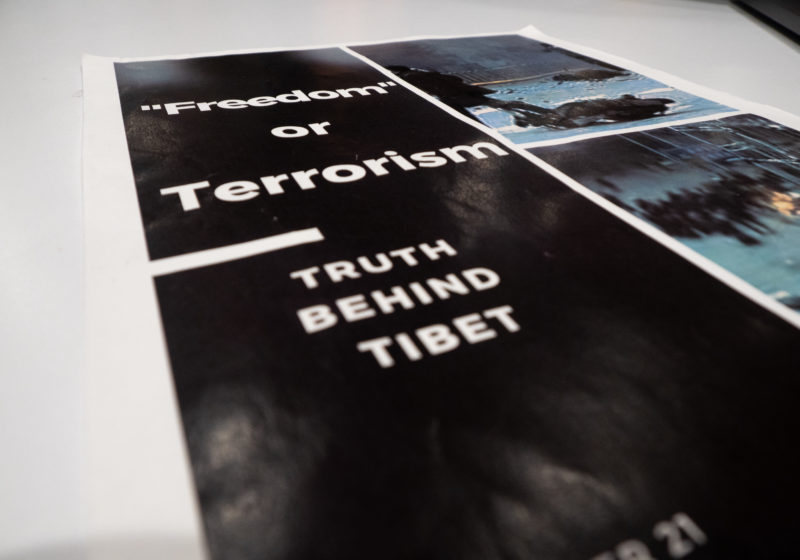Jessica Guzman-Rea let out a long breath.
“Sorry, just give me a minute,” she said.
All week, the Intercultural Center director had been in meeting after meeting related to Sept. 23’s polarizing confrontation involving three Tibetan monks and some Chinese international students outside Wilson Commons’ Starbucks.
What had started out as just another campus event — “Tibet dialogue: Democracy-in-Exile and the future of Tibet” — had become a full-blown controversy sparking the Starbucks incident, multiple online spats, and the filing of more than 50 bias incident reports to her office.
On the surface, the disagreement was political. But, said Guzman-Rea, it was deeper than that. Students — Tibetan, Chinese and others — were beginning to feel unsafe, targeted. Some had stopped going to class. Others were having nightmares.
Addressing what made students feel this way can be a challenge. “It’s not tangible,” Guzman-Rea said. But incidents form a trail to the beginning, when the idea for the event first took off.
———
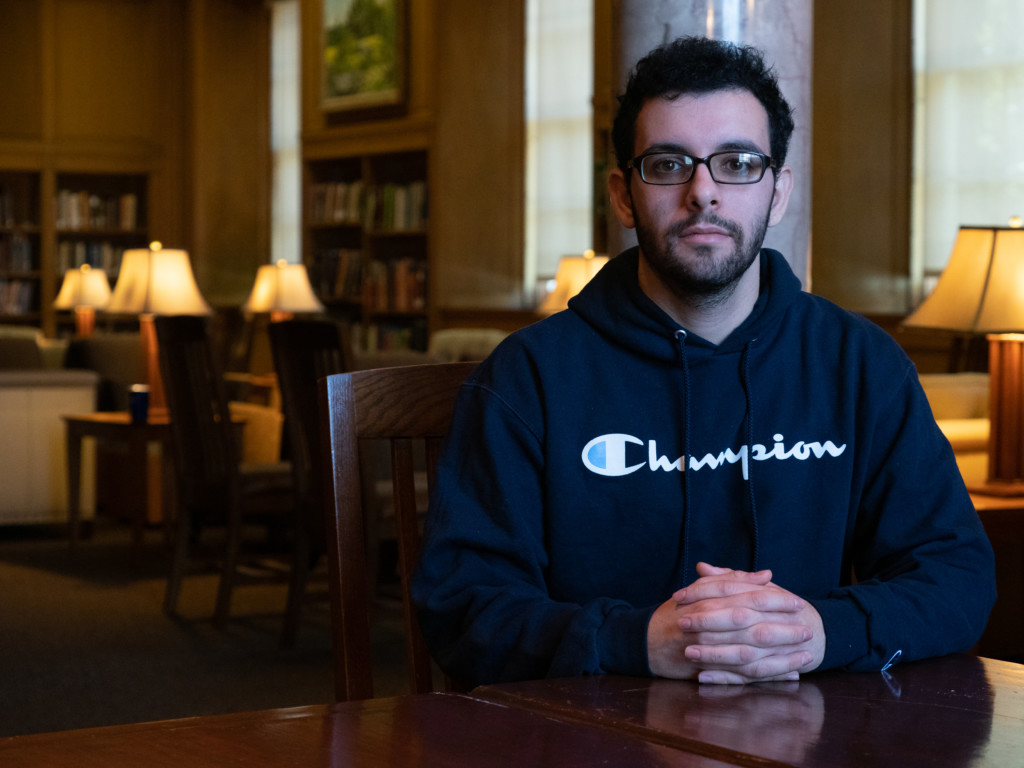
Senior Anthony Pericolo, president of UR College Republicans, in the Welles-Brown room of Rush Rhees Library, where meetings are usually held. Photo by Henry Litsky | Photo Editor
The College Republicans are no strangers to campus scrutiny. Last March, their event, “Religious Extremism in the Middle East,” took place six days after the New Zealand mosque shooting. A petition to cancel the event, which had been planned months in advance, garnered over 150 signatures, and protesters showed up to the event itself.
So this semester, said senior and group president Anthony Pericolo, College Republicans wanted something “non-controversial.” A poll of members revealed an interest in foreign policy, and Pericolo was friends with Se Hoon Kim, a graduate student with connections to representatives of the Dalai Lama.
Kim, who hails from New Jersey and has South Korean heritage, had organized events on Tibet before — one as recently as last year.
But as the day drew closer, issues arose.
Two weeks before the event, junior and Chinese Students’ Association (CSA) president Sampson Hao met with Pericolo and expressed concern that the event would lead Chinese students to be or feel targeted.
In the meeting, Pericolo explained that his group had planned the event without consulting CSA because the event focused on the American values of Tibet’s government-in-exile, like democracy and freedom of religion. He refused CSA’s request to see the panel questions, but allowed them to submit questions for the Q&A session.
Not long after that, Kim met Yifan Xu, whose actions would elevate the conflict to a public dispute.
———
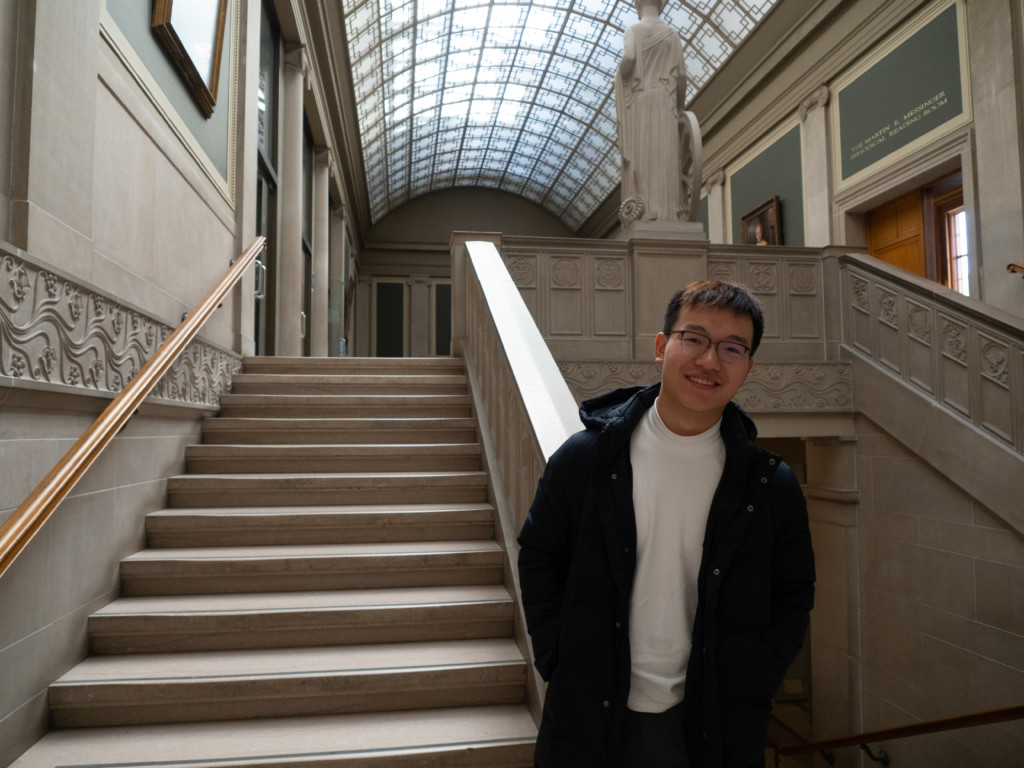
Sophomore Yifan Xu, who says he is a member of the “Tibet Event Group,” formed against College Republicans’ event. Photo by Henry Litsky | Photo Editor
Xu grew up in a rural part of Anhui: a historically poor province in mainland China that has recently experienced swift economic growth. But the memory of poverty hasn’t faded so quickly.
For his grandfather, Xu said, access to food, let alone education, was sporadic. For Xu’s father, Kun, eating meat was a treat reserved exclusively for the annual Spring Festival. Kun was the only child from his hometown to attend high school.
Xu’s father got a job as a teacher that paid the U.S equivalent of about $500 a month, Xu said. Then, when Xu was 10, his father started an education company. As it took off, his family moved to Anhui’s capital, where Xu attended the best middle school in the Province.
That education is what got Xu to America — initially studying at Penn State, until he transferred to UR this year — and is the reason he believes some things are more important than human rights.
“I respect human rights,” Xu said. “I think Chinese government should improve the human rights in the future. But now, there’s still many people on the poverty line. They need food, they need education.”
When he heard that the College Republicans were planning the Tibet event, and that CSA was not invited to speak, he and five other students banded together, calling themselves the “Tibet Event Group,” and made a plan.
Xu reached out to Kim, asking for time to deliver a speech representing mainland China’s perspective on the Tibet issue. It was too late to restructure the event, but Kim promised Xu five minutes during Q&A to make his case.
Two days before the event, Kim saw flyers for his event that he didn’t recognize. The new version, pasted on boards all over the school, cited the same time and place but called the event “Tibet: ‘Freedom’ or Terrorism?” The background photo showed a man engulfed in a blaze of fire — the self-immolation technique Tibetans use to protest against China’s rule.
Xu said the posters were meant to be provocative. They succeeded.
———
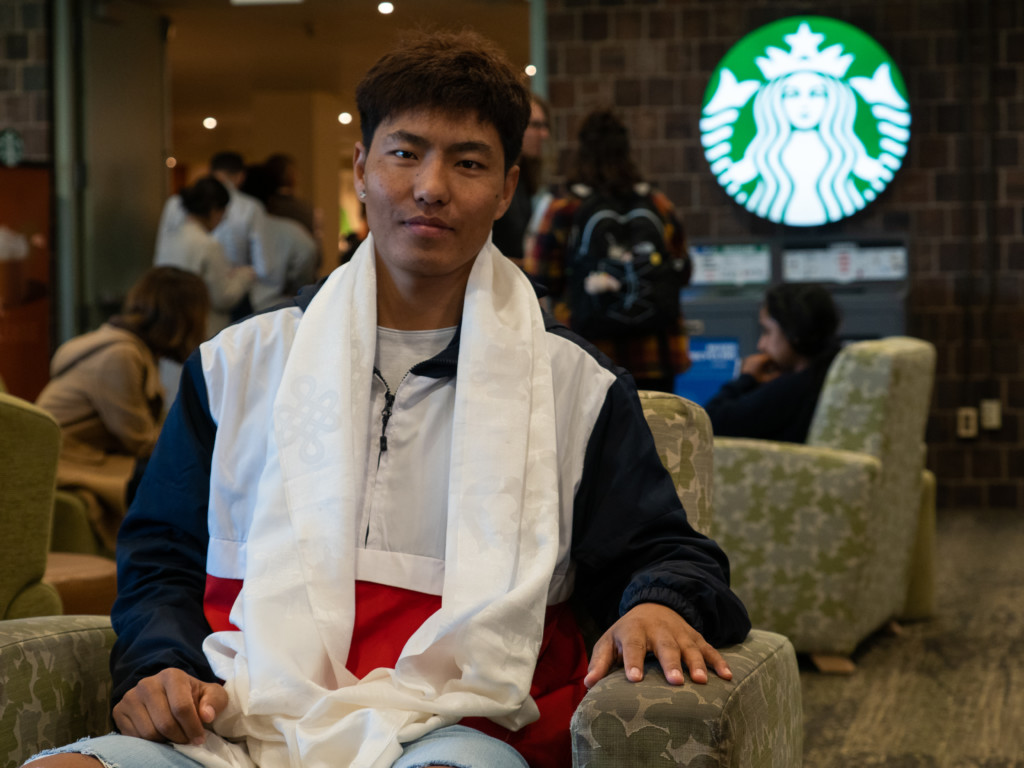
None Gongyal, wearing a katak at the Starbucks where the confrontation with three Tibetan monks occurred. Photo by Henry Litsky | Photo Editor
“I got so mad,” said None Gongyal, a sophomore from Tibet. “I mean, it hurt me. I know the reason why these people self-immolate: because they don’t have any other means to show their grievances.”
Gongyal said he escaped from Tibet with his family when he was 11 years old. His mother told him it would take three days for their family of six to reach India. It took 30 days without food, trudging through the snow. Still, Gonyal said, it was worth it.
Neither Gongyal, nor any of his four siblings, ever attended school in Tibet. Their mother did not want them to be forced to learn Chinese, or indoctrinated to feel patriotic towards China. Instead, Gongyal’s grandfather taught him how to read and write Tibetan at home — even though, he said, the price for promoting Tibetan culture was torture or death.
Leaving Tibet gave Gongyal and his family the freedom to speak their language, and practice their culture and religion without fear of persecution. Seeing the posters, he said, felt like being repressed all over again.
———
At the Tibet event on Sept. 21, Xu was the first to speak after Ngodup Tsering, the representative of the Dalai Lama, concluded his speech on Tibet’s middle-way approach to independence.
Xu laid out his arguments on why Tibet needed to remain part of China, and criticized the event as one-sided. The microphone runner shook his head at Xu as he exceeded his time limit.
“Don’t rely on Wikipedia,” yelled an audience member as Xu spoke. At the end, the Tibet Event group members distributed their report: a pamphlet further outlining their arguments on why Tibet needed to remain part of China.
Still, the event survived the tension. At the end, Kim shook Xu’s hand.
“That would have been the end of it,” Kim said.
But then Starbucks happened.
———
A wholly objective account of what happened at Starbucks that following Monday could not be gathered.
What is known is Kim invited three Tibetan monks with no connection to Saturday’s Tibet event to meet the Tibetan students at Starbucks.
As they spoke of meditation practices and advice for school, the monks also blessed the students, draping thin white scarfs called kataks around their necks.
In the midst of this, a Chinese student brought out a chair, and set it down next to the monks with a flyer on top that said “Tibet is part of China.”
“What are you trying to instigate? Why are you doing this?” Se Hoon said he asked the student, who evaded his question.
It was at this point that the monks and the group conversing with them, packed up their things and left.
Regarding all other details, rumors erupted across online channels.
Xu heard that the Chinese student acted because they heard the group spreading sentiments of Tibetan independence. Some heard that Kim tore the Chinese student’s paper. Others heard the Chinese students tried to take pictures of the Tibetan students as they left.
The first online post about the incident, placed in a popular UR meme page, described the Tibetan monks and group of students as having been “harassed and chased out of Starbucks.”
Over the next few days, the intensity of online debates increased, while the feeling of safety for Tibetan and Chinese students plummeted.
“I went through the same stuff in Tibet,” said Gongyal, “now I feel like I’m also under threat by the Chinese government even in a country like this.”
One anonymous post from the popular UR Secrets & Confessions Facebook page said: “Now I may be grabbed by someone in Starbucks, forced to comment on incidents that I have no idea at all, and regarded as ‘brainwashed’ and ‘spy.’”
———
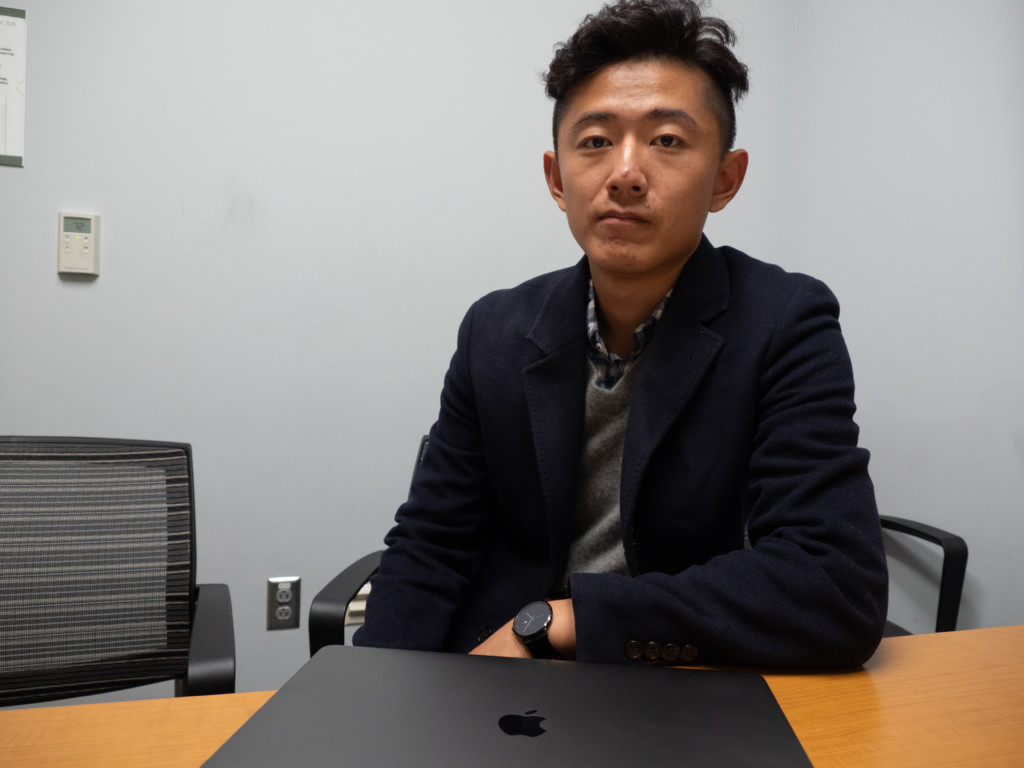
Junior Sampson Hao, president of the Chinese Students’ Association. Photo by Henry Litsky | Photo Editor
Guzman-Rea said the situation has uncovered the need for training on how to hold civil dialogue for all student organizations. Her office is holding a restorative circle for the e-boards of College Republicans and CSA on Friday, as well as a larger, public one on Oct. 23.
The College Republicans’ next planned event is “The Uyghur Issue: Academic Dialogue on Human Rights.” Uighurs are Turkic Muslims, subject to mass incarceration and assimilation in China. The Facebook event currently has around 400 people marked as “going” or “interested.”
CSA took the first step towards an appeal to cancel it, prompting College Republicans to call for a Student Code of Conduct investigation into CSA, which in turn prompted Xu to call for a Student Code of Conduct investigation into the Republicans.
Hao has said that CSA would prefer to reach a compromise, such as changing the moderator, than to cancel the event.
“This thing has nothing to do with politics,” Hao said about CSA’s reason for filing the appeal, which he said they did to protect Chinese students who were feeling targeted after Starbucks. CSA also denies College Republicans’ accusation that the Tibet Event Group has any affiliation with their organization.
On Tuesday, Pericolo withdrew the call for an investigation into CSA. Hao told the Campus Times that if a satisfactory agreement between the clubs can be reached, then he will drop the appeal against College Republicans.
But for Pericolo, there is no question.
“Our Uighur event is absolutely gonna happen,” Pericolo said. “If people want to disagree with us, they are welcome to […] but we will not cancel this event.”
